- Home
- Stephen R. Donaldson
The Man Who Fought Alone Page 5
The Man Who Fought Alone Read online
Page 5
I was still a couple of hours early when I spotted the hotel. By Carner’s standards it wasn’t particularly huge. Nevertheless it could’ve swallowed the population of a sizable town. At first glance, it looked like The Rubik’s Cube that Ate New York, partly because it was a cube, as wide and deep as it was tall, but mostly because some stoned hotel designer in a moment of perfect hallucination had decided to paint the damn thing with uncoordinated colors in random blocks maybe forty feet square.
In front of the entry-portico—a required feature for modem hotels—a fountain sprayed sheets of water that never seemed to reach the ground. Since I didn’t like the building, I hoped this wasn’t really where the IAMA meant to hold its tournament. Unfortunately a tall stream of running lights around the rim of the hotel identified it as The Luxury Hotel and Convention Center, and a blazing marquee between the fountain and the street announced:
WELCOME
IAMA
World Championships.
Oh, well. Abandoning the Subaru in a parking lot that could’ve landed jumbo jets, I crouched behind my sunglasses until I reached the hotel lobby. Then I started to familiarize myself with the place.
For Carner, The Luxury was pretty generic. I didn’t have any trouble locating the convention facilities, which took up at least the first four floors. They may not have been the best facilities in town, but they offered enough space to hold Billy Graham’s latest “crusade” plus the entire Mormon Tabernacle Choir. A reduced version of the hotel marquee told me I was in the right place. It said:
IAMA World Championships
9 A.M. to 9 P.M.
Friday, Saturday, Sunday.
Smaller print mentioned guests I’d never heard of—Bill “Superfoot” Wallace, Benny “the Jet” Urquidez, Fumio Demura.
I had less than two hours left, so I got serious.
For a start, I studied the hall itself, which turned out to be a rectangular cavern the size of a tennis stadium, with a high sound-baffled ceiling and the moral equivalent of Astroturf for carpet. Lines of tape on the floor marked out twelve squares in two long rows—presumably the competition rings. At one corner of each square, a tall pole raised the ring’s number so everyone could see it. Exactly five folding chairs had been placed along one side of each square, with two more on the left. More tape indicated aisles between the rings. Outside the rows, chairs on adjustable tiers rose like bleachers toward the distant walls.
At one end of the hall, a dais with a clear view of the rings held a row of trestle-tables draped with green cloth. The tables sported a couple of microphones. On both sides of the dais, large sections of the floor had been roped off like staging areas. Maybe Sternway’s “antique martial arts artifacts” would be displayed in one of them. What the other was for I couldn’t imagine.
Already I had to adjust my preconceptions. Until I looked around the hall, I hadn’t realized that I’d expected something less elaborate. I’d known vaguely that karate was a growing sport. But if I’d risked a guess at the size of the IAMA’s championships, I would’ve said forty competitors, max, with maybe twice that many spectators. Obviously this tournament had other ideas.
When I was confident that I knew the layout well enough to cope with hundreds of people blocking my view, I located all the fire-alarm boxes, phone jacks, and security cameras in the vicinity. Then I turned my attention to the hall’s access points.
There were six, three sets of double doors spaced out along each of the longer walls roughly opposite each other. On one side, of course, they opened toward the hotel’s lobby, restaurant, and bar. On the other, service corridors led to the kitchens, offices, storerooms, and laundries which handled conventions. This was the part of the hotel I worried about. If trouble wanted to sneak in or out, it would probably go through here.
So I spent the rest of my available time wandering those corridors, paying particular attention to the ones that ended in exits. They were all windowless and blind—apart from the occasional security camera. Once I got used to them, however, the pattern seemed simple enough. Several times I encountered people who worked there. But they left me alone after I told them that I had a 1:00 P.M. appointment with their Chief of Security, and I was getting acquainted with the hotel so I’d be ready to talk to him.
With fifteen minutes to spare, I went back to the lobby and asked the bell captain for directions to my appointment. Five minutes after that, I found myself in an office midway down a long hall which left the lobby from one end of the Reception desk.
Like the rest of The Luxury, the Chief of Security’s office was essentially generic, decorated in Mid-Level Functionary, with a painfully artificial fern potted in one corner, a couple of modest desks, and a large marker-board calendar scrawled black with employee schedules and convention dates. The man who held my future in his hands was named Bernie Appelwait, and he wasn’t glad to see me.
He was a short unshaded cartoon-sketch of a man, with the kind of pallor that made you want to slap some color back into his cheeks. A swirl of white hair, watery eyes, swollen knuckles, and a larynx like a goiter made it obvious that he was getting on in years, and age hadn’t been kind to him. In fact, it’d made him downright bitter—or so my instincts told me. Whenever he opened or closed his mouth, he did it vehemently, like trying to snap flies out of the air. The rest of the time, he moved and talked like a worn-out wasp, whining with threats he didn’t have the energy to carry out.
When I offered him my hand, he ignored it. His glare conveyed the impression that I’d just proposed to rape his mother’s cadaver.
Oh, well. Viviter had asked me to be more polite. Taking a crack at good manners, I dropped my hand and remarked mildly, “My name’s Axbrewder. We have an appointment.”
I didn’t need to ask who he was. A silver badge on his navy blazer and a plaque on his desk both identified him.
His mouth snapped. “I wondered when you’d bother to get here.”
I made a production out of checking my watch and looking innocent. “Am I late?”
He snorted. “You’ve been here so long we could’ve wrapped this up an hour ago. I would’ve come to get you, but I wanted to see how much snooping you’d do on your own.”
On the inside, where he couldn’t see it, I gave him a bow. Maybe he wasn’t nice about it, but he knew his job. Security cameras and employee reports had enabled him to keep track of me.
“Mr. Appelwait,” I explained more sharply, “I want the job. The way I figure it, I won’t be much use to you if I can’t find my way around the hotel. So I came early to look at the layout.”
If he appreciated my diligence, he didn’t show it. “So you can get out fast.”
I blinked. “Why do I want to get out fast?”
“After you snatch those ‘artifacts’ everyone’s so fastidious about, you’ll try to leave before we can catch you.”
“After I—?” For a prospective employer, he had a hell of an attitude. Just for a second, I considered turning my back on the whole thing. Forgetting all about Marshal and his help. Before I said something I might regret. But I swallowed the impulse. Instead I stared at him. “You aren’t serious.”
He went on glaring. “Doesn’t matter whether I am or not. Watchdog Insurance is.” He snorted again. “They’re afraid I’ll hire some crook who just wants to rip them off. Like I wouldn’t know a hard luck rent-a-cop when I see one. Besides, I bet you can’t tell the difference between antique Chinese ivory and plastic flatware. You’re lucky they condescended to let me make this decision. If they were here, they’d tell you to stand on your head so they could interview your crotch.”
Finally I got the message. He didn’t have a problem with me. His grievances faced in other directions. He thought he deserved more respect than Watchdog gave him.
I could live with that. “This is just my opinion,” I ventured, “but I think you’ve been insulted.”
“It wasn’t an insult,” he retorted. “It was a fucking affront.” His teeth tore
off chunks of air and chewed them out again. “Little insurance twerp who still eats Pablum for breakfast thinks he can tell me how to do my job.
“Call me Bernie. ‘Mr. Appelwait’ takes too long.”
I relaxed a bit. “That suits me, Bernie. Call me Brew.”
Buzzing harmlessly, he dismissed the idea. “I’ll call you Axbrewder.” Something that might’ve been a smile sneaked across the background of his glare. “Remind myself not to like you.”
“You’re in no danger,” I assured him. “Even my friends think I’m an acquired taste.”
He treated me to a show of disbelief. “You have friends? Now I’m impressed.”
I wanted to make a snappy comeback, but I couldn’t think of one, so I dropped it.
Slowly he moved around one of the desks and lowered himself into a chair with a circular cushion on the seat—a piles-pillow. When he was comfortable, he gestured me to a seat across from him.
Folding his arms behind his head, he leaned back and got down to business.
“I won’t bullshit you, Axbrewder. At my age, I don’t have the patience. This situation caught us by surprise. And Watchdog dithered too long. I don’t have time to make a project out of hiring extra security. If I turn you away, I’ll have to accept whatever I can sublease from Professional Investigations, or one of the other agencies.
“Viviter referred you. Him I don’t like, but his rep’s clean.” Bernie rolled his eyes. “In fact, if he weren’t so full of snot he’d squeak when he walks.
“Besides, it’s only for three days. What’re you going to do? Crack the hotel safe when I turn my back? Burgle the rooms? Even guys like you aren’t that stupid.” He sounded like he meant, Guys like us. “As far as I’m concerned, the job is yours to lose.”
I started to say, “I’ll take it,” but he cut me off.
“Don’t be too eager. This kind of work is boring, but that doesn’t make it easy. By nine tomorrow, that hall will be a zoo. I’m told we have ‘martial artists’ from all over the world staying here. They may even be famous, I wouldn’t know. As far as I’m concerned, they’re just a bunch of gooks in pajamas. But they all have their cliques and flacks and fans and teams, and their ‘revered masters.’ And then they bring their equipment, which they leave everywhere.
“On top of that, they’re all so tanked on competition hormones they think they don’t need hotel security to keep an eye on them, and they as sure as shit don’t need ordinary safety precautions like keeping the aisles clear and obeying the fire regulations. And on top of that”—he was starting to enjoy himself—“they’ll have an audience of several hundred devoted ‘experts’ who can’t tell the difference between kung fu and cunnilingus.”
I tried to look austere so I wouldn’t laugh. “Rather like me in that regard,” I remarked.
He chuckled, then snapped his mouth shut. “Don’t do that. I already told you I don’t want to like you. I’m trying to convince you this job isn’t easy.”
Raising my hands to placate him, I murmured, “Sorry.”
“I can see that,” he drawled.
When he’d recovered his glare, he resumed.
“The hours are long. From eight in the morning until past midnight, you’ll be up to your navel in gooks who don’t have any use for you, and the only real reason you’ll be there is to watch for petty theft. Wallets, watches, jewelry. And equipment.” Shaking his head in disbelief, he explained, “According to claims from past tournaments, some of that gear is worth stealing. Even here, where they sell Nikes and crotch-cups on every block.
“But,” he informed me, “we’ll have guards on those artifacts all the time. That’s our only major concern, and you won’t have to worry about it.” He didn’t need to say why. I was an outsider. No matter how he felt about guys like me, he trusted his own people more. “Your job will be to circulate, control disturbances, clear the way for the paramedics when someone gets hurt, and try to catch petty crooks.
“It won’t be enough to keep you awake. In a normal year, the claims from this tournament hardly amount to a thousand bucks. But I don’t care about that. If you don’t stay awake, I’ll fire your ass so fast you won’t be able to find it for weeks.”
I waved my hands again. “Enough, Bernie. You already said it. I’m ‘a hard luck rent-a-cop,’ and I need the paycheck.” Looking straight at him, I added, “I don’t expect you to cut me any slack. If I can’t do a job like this, I should be in some other line of work anyway.”
He nodded once, sharply. “You got that right.” Then he changed gears. “You’re stiff when you move.” He didn’t ask why. “Can you stay on your feet all day?”
I shrugged. “Try me. I’m stubborn.”
“I’m sure you are.” His glare had a charm all its own. “But now that we’ve talked about it, you won’t be able to file for disability when you decide we crippled you.”
He was just doing his job, so I didn’t get mad.
“I’ll expect you here,” he announced, “at eight tomorrow. After that, I’ll comp you a room for the rest of the weekend, spare you driving back and forth. You don’t get a uniform. I don’t want you identified as hotel security. You’ll see more if people don’t know you work here. I’ll supply everything else.”
While he talked, he tilted back to his desk so that he could toss me a couple of forms to sign. I glanced at them to make sure I knew what they were, but I didn’t bother reading them.
The main advantage of a complimentary room was that I could avoid Ginny for a couple of days.
While I scrawled my signature, Bernie added, “You’ve already done your snooping, so we’ll skip the tour.
“Any questions?”
Ginny would’ve had questions—the kind he meant—and if I’d strained my brain I might’ve been able to think of an example. But my interests, or my instincts, ran in different directions. Which made us pretty effective when we were together—and made me feel like I only had half my senses when we weren’t. As far as I was concerned, this job wasn’t about petty theft, and “gooks in pajamas,” and security. It was about Marshal Viviter and Bernie Appelwait. And, presumably, Anson Sternway.
I didn’t ask the questions Bernie expected. Instead I asked him what I wanted to know. But I did it obliquely, just in case he felt inclined to take offense.
“I guess you’re prone to liking people too much, but I have to say, you hide it well.”
He glared harder to cover up a wince. “Women, mostly. Since my wife died.” He paused, and I thought he was done. A moment later, however, he admitted, “But recently I’m having the same trouble with men. I see a guy with an honest face, and suddenly I want us to be friends for life.
“Take my advice, Axbrewder. Don’t get old. They say it beats being dead, but I say, don’t talk to me until you’ve tried both.”
Sounding more than ever like a wasp, he rasped, “Now shut up and get out of here. I have work to do.”
On command, I climbed to my feet—stiffly—and headed for the door. Bernie Appelwait wasn’t going to die of old age. If someone didn’t feed him a little respect soon, he’d die of emotional starvation.
As I opened the door, he stopped me. When I turned around, I saw him leaning toward me with his elbows propped on the desk top, pointing at me with a finger that couldn’t straighten all the way.
“One more thing, Axbrewder. Leave your iron at home.”
Just for a second. I didn’t understand him. Sounding particularly intelligent, I said, “Huh?”
“This is a hotel,” he explained acidly, “not a bordello. We don’t want anyone shot. We don’t even want guns going off. It’s bad for business. And Watchdog won’t cover it. We’d rather get robbed.”
“No problem.” I attempted a smile to cover my confusion. He must’ve noticed the bulge of the .45 under my jacket. “It’s just bluster anyway. I can’t hit anything.”
Before he started buzzing around the room again, I closed the door and left.
Ou
tside The Luxury, heat shimmered on the parking lot, distorting everything, and the pavement felt vague under my heels. Without sunglasses I would’ve been too blind to find the Subaru. The way it slumped between its wheels made me think its tires were melting. When I got in, the vinyl of the seat scorched me through my suit. I didn’t realize how hard I was sweating until drops of water smeared my glasses.
If this was winter in Carner, I sure as hell didn’t want to see summer.
With the AC straining, I drove back to the apartment.
Along the way, I asked myself what to tell Ginny. I liked the idea of just keeping my mouth shut. After all, she’d pretty much stopped talking to me. But I didn’t trust that reaction. Most of our problems came from not talking to each other.
Manfully I decided to explain everything. Which included my conversations with Marshal. It would do me good to clear the air. If I ever managed to grow as old as The Luxury’s Chief of Security, I didn’t want to be bitter about it.
But that night there wasn’t any air left to clear. Ginny didn’t come home.
5
If I slept that night, I didn’t notice it. My heart suffered while my brain fumed. Marshal, I thought, she’s with Marshal. In his bed. Tasting all that handsomeness—She’d had an affair less than a month ago, hadn’t she? Why not another one now?
Meanwhile my heart insisted that she was in trouble. Marshal had given her a dangerous assignment, and I was her partner, but I wasn’t there to back her up.
I didn’t know how to endure it. How had we come to this, when all I’d ever wanted was to stand beside her?
Sometime after midnight, I called Sam Drayton in Puerta del Sol.
I considered him a friend, even though we’d spent less than a week together. He and his wife, Queenie, had been involved in the case that eventually convinced Ginny to get me out of town. And Queenie had nearly died, accidental victim of a cocaine overdose aimed at someone else.

 The Illearth War
The Illearth War Last Chronicles of Thomas Covenant 02 - Fatal Revenant
Last Chronicles of Thomas Covenant 02 - Fatal Revenant Lord Foul's Bane
Lord Foul's Bane The Gap Into Ruin: This Day All Gods Die
The Gap Into Ruin: This Day All Gods Die White Gold Wielder
White Gold Wielder Fatal Revenant
Fatal Revenant The Mirror of Her Dreams
The Mirror of Her Dreams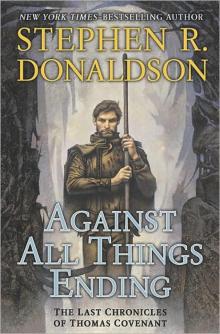 Against All Things Ending
Against All Things Ending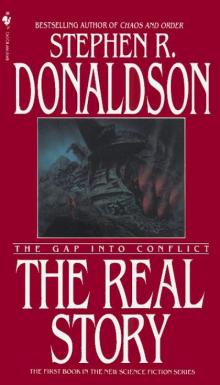 The Real Story: The Gap Into Conflict
The Real Story: The Gap Into Conflict The Power That Preserves
The Power That Preserves Seventh Decimate
Seventh Decimate The Gap Into Power: A Dark and Hungry God Arises
The Gap Into Power: A Dark and Hungry God Arises A Man Rides Through
A Man Rides Through The Gap Into Vision: Forbidden Knowledge
The Gap Into Vision: Forbidden Knowledge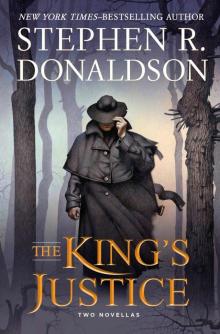 The King's Justice: Two Novellas
The King's Justice: Two Novellas The Wounded Land
The Wounded Land The Runes of the Earth
The Runes of the Earth Mordant's Need
Mordant's Need The One Tree
The One Tree Gilden-Fire
Gilden-Fire Reave the Just and Other Tales
Reave the Just and Other Tales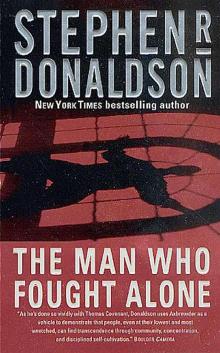 The Man Who Fought Alone
The Man Who Fought Alone The Last Dark
The Last Dark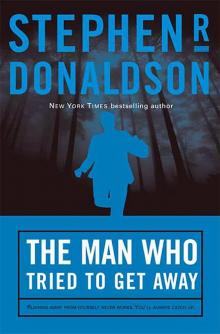 The Man Who Tried to Get Away
The Man Who Tried to Get Away Thomas Covenant 02: The Illearth War
Thomas Covenant 02: The Illearth War A Dark and Hungry God Arises
A Dark and Hungry God Arises The One Tree t2cotc-2
The One Tree t2cotc-2 Lord Foul's Bane cotc-1
Lord Foul's Bane cotc-1 The Illearth War t1cotc-2
The Illearth War t1cotc-2 The Runes of the Earth: The Last Chronicles of Thomas Covenant - Book One
The Runes of the Earth: The Last Chronicles of Thomas Covenant - Book One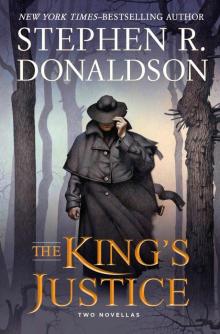 The King's Justice
The King's Justice White Gold Wielder t2cotc-3
White Gold Wielder t2cotc-3 The Power That Preserves t1cotc-3
The Power That Preserves t1cotc-3 Thomas Covenant 01: Lord Foul's Bane
Thomas Covenant 01: Lord Foul's Bane Chaos and Order: The Gap Into Madness
Chaos and Order: The Gap Into Madness Daughter of Regals
Daughter of Regals Forbidden Knowledge: The Gap Into Vision
Forbidden Knowledge: The Gap Into Vision Fatal Revenant t3cotc-2
Fatal Revenant t3cotc-2 The Runes of the Earth t3cotc-1
The Runes of the Earth t3cotc-1 Thomas Covenant 03: Power That Preserves
Thomas Covenant 03: Power That Preserves This Day all Gods Die: The Gap into Ruin
This Day all Gods Die: The Gap into Ruin The Wounded Land t2cotc-1
The Wounded Land t2cotc-1 This Day All Gods Die
This Day All Gods Die One Tree
One Tree